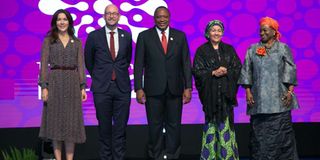New lobby to keep track of ICPD25 resolutions

President Uhuru Kenyatta with (from left) Denmark officials Her Royal Highness Mary- Crown Princess, Rasmus Prehn, Ms Amina J. Mohamed of the UN and Dr. Natalia Kanem, Executive Director of the UNFPA at the official opening of the Nairobi Summit on ICPD25 last year. Dr Kanem says Covid-19 is blocking access to essential services, like family planning and antenatal care around the world.
What you need to know:
- High-level commission of international advocates, experts and activists established to ensure commitments made on women’s health and rights at last year’s Nairobi International Conference on Population and Development are fulfilled even during the Covid-19 pandemic.
- UNFPA Executive Director Dr Natalia Kanem troubled that the ongoing pandemic was blocking access to essential services, such as family planning and antenatal care in many places around the world.
- Membership of the High-Level Commission is chaired by, Former President of the United Republic of Tanzania—H.E. Mr Jakaya Kikwete and 27th Governor General of Canada, H.E. Michaëlle Jean.
A new high-level commission of international advocates, experts and activists has been established to ensure commitments made on women’s health and rights at last year’s Nairobi International Conference on Population and Development (ICPD25) regarding sexual and reproductive health and rights, are fulfilled even during the Covid-19 pandemic.
The United Nations sexual and reproductive health agency — UNFPA Executive Director Dr Natalia Kanem, while unveiling the 28-member commission recently said she was troubled that the ongoing pandemic was blocking access to essential services, such as family planning and antenatal care in many places around the world.
The November 2019, Nairobi Summit on ICPD25 secured billions of dollars in commitments from governments, the private sector, foundations and others for the implementation of some 1,250 commitments during the Summit.
It rallied support to achieve “three zeros” – zero unmet need for family planning, zero preventable maternal deaths, zero gender-based violence and harmful practices – with partners making bold commitments to transform the world by ending all three practices against women and girls by 2030.
Marginalized communities
The Nairobi Summit mobilised more than 1,200 commitments from around the world, including billions of dollars in pledges from public and private sector partners. It also raised the voices of marginalized communities, youth and grassroots advocates, who were able to directly engage heads of state and policymakers about how to realize the rights and health of all people.
At least 170 countries promised to strive for achieving universal access to sexual and reproductive health, for all.
Kenya, UNFPA and the governments of Denmark convened the Summit 25 years after the landmark first ICPD in Cairo in 1994, which culminated in a global agreement that sexual and reproductive health and rights are a necessity for growth and prosperity.
But Dr Kanem said progress in securing these rights has stalled.
High level commission
“Since the Nairobi Summit, the road to 2030 and the achievement of sexual and reproductive health and rights for all has grown steeper due to Covid-19,” said UNFPA Executive Director Dr Kanem.
“Yet we continue to forge ahead, to back up words with deeds and action on the ground. The new High-Level Commission will help all of us who made commitments in Nairobi keep those promises.”
The membership of the High-Level Commission is chaired by, Former President of the United Republic of Tanzania—H.E. Mr Jakaya Kikwete and 27th Governor General of Canada, H.E. Michaëlle Jean. Its members range from former heads of state to grassroots activists and youth.
The 28-member commission will monitor and report on progress towards fulfilling the 1,250 commitments made at the Nairobi Summit, and in particular the 12 global commitments contained in the Nairobi Statement on ICPD25, and make recommendations for removing bottlenecks so that the sexual and reproductive health and rights community maintains its momentum towards a world of rights and choices for all.



